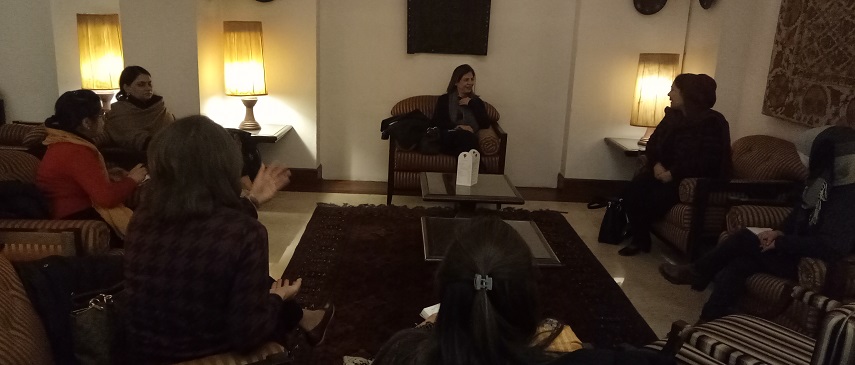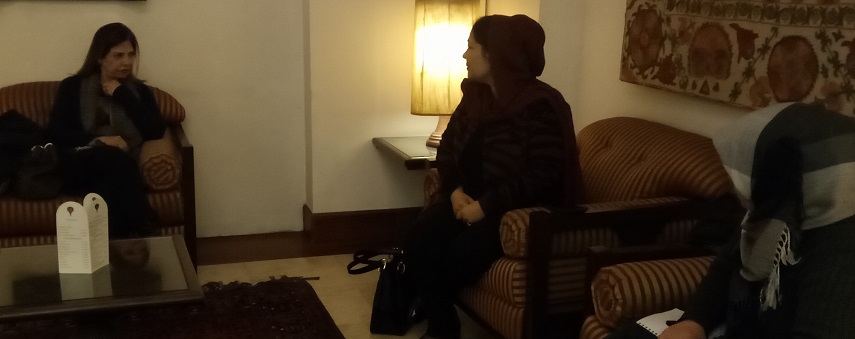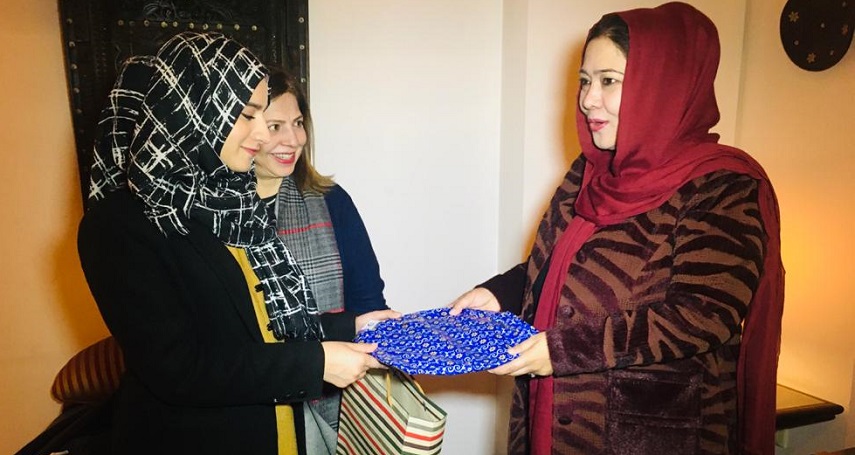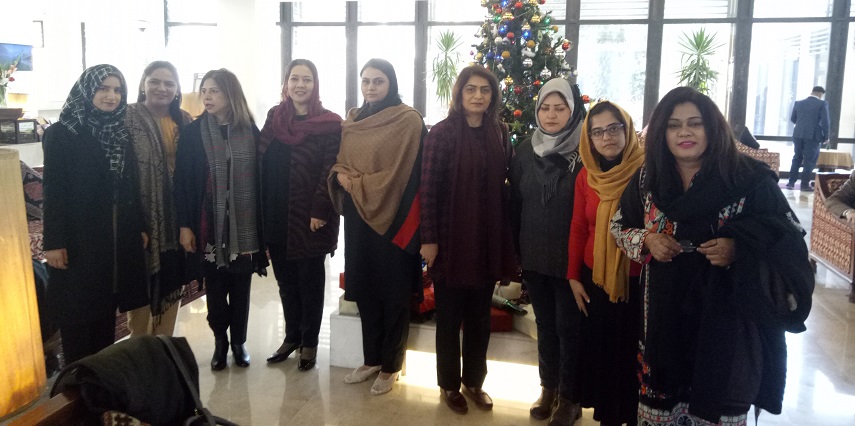On December 29, 2019, the Pakistan women-led delegation, headed by Ambassador Tasnim Aslam, met with the President of Afghanistan Women Chamber of Commerce and Industry (AWCCI), Ms. Manizha Wafeq, Chairperson SAARC Chamber Women Entrepreneurs Council (SCWEC), Ms. Afsana Rahimi, and Vice Chair SCWEC, Ms. Habiba Payandanik, in Kabul.
Ambassador Tasnim Aslam stated there were two delegations in Kabul from Pakistan – one is the trade, commerce and economic connectivity, which was incidentally all men, and then there is this all-women delegation – though not just focusing on women issues but visiting Kabul to meet women in various fields, including government, entrepreneurship, civil society organizations and so on.
Ambassador Aslam stated that while we talk about empowering women in the business domain, since we have a similar environment in both countries, and as there are businesswomen out there working, how can we bring together your talent and our talent in this field to pave the way to make women more financially independent and empowered.
Chairperson, SCWEC, Ms. Afsana Rahimi stated that there are many avenues of opportunities if the women on both sides wanted to work together. She further said that in many meetings that were held in the region between women, there was a lot of interest in working together but nothing tangible came out in terms of outcome after those meetings, unfortunately. She nevertheless wished that the two sides could start cooperation after this meeting.
Ambassador Aslam said that the CRSS delegation could assist in facilitating the coming together of business women from both sides, clarifying that the delegation was not in Afghanistan on behalf of the government of Pakistan. She also stated that the delegation could also convey the concerns of the businesswomen to the government of Pakistan following these meetings, for improving trade relations between the two countries.
Ms. Manizha Wafeq, President of AWCCI, then gave an overview of AWCCI which was established in March 2017, prior to which it existed as a national women business association, since 2013. Since then, there have been a number of policy changes – a clause included in the national procurement authority for contracting more women on businesses, especially if they are certified by the Women Chamber of Commerce and Industry. Another policy change was 15% to 25% of land allocation for SMEs and women-owned businesses in the country. Even before that, giving a seat to AWCCI at the high Economic Council and other high councils in urban development, land management, legal issues, environment protection, private-sector executive committee and so on, have been other policy changes in recent years for AWCCI and prospects for businesswomen, said Ms. Wafeq.
She further stated that, in addition to the database of 1500 women-owned businesses in the country that is being kept by AWCCI, there are thousands of other businesses by Afghan women but they are informal. These 1500 women-owned businesses are half in handicraft businesses while the other half are in non-traditional, modern and male-dominated sectors, such as, media services, IT, private sector schools, private sector health clinics, manufacturing, transportation, logistics, restaurants and so on. These businesses are mostly in the big cities, such as Kabul, Herat, Bagh, Kandahar, Badakhshan, and so on.
Ms. Manizha Wafeq stated that now Afghanistan is doing the strategic planning for the next five years of how SCWEC should work for women entrepreneurs of the region, not just Afghanistan. She went on to say that the women in all the South Asian countries can make an active and beneficial use of the SAARC platform for their empowerment.
Ambassador Aslam stated that the delegation is certainly keen that the women entrepreneurs of both countries interact and if they can come together and form business associations, such as joint ventures, by pooling-in their resources and talent and then go internationally together. Certainly, SAARC, for various reasons, is unfortunately not working, she noted. While the two countries can reiterate their commitment to making SAARC a region of free trade, free movement and development, but the ground political realities are very different. The latest situation in Pakistan’s western neighborhood also poses more challenges for such development to be possible for Pakistan’s peace. Therefore, she said, we would want the two delegations to focus on bilateral possibilities. She offered that CRSS could help bring women entrepreneurs from both countries together.
Ambassador Tasnim stated that Pakistan is a big market for most of Afghan goods, such as it buys all of the coal and textiles that Afghanistan produces as well as perishable goods, such as fruits. However, what new avenues can women entrepreneurs explore is what the women entrepreneurs need to focus on as well.
Ms. Maniza Wafeq stated that AWCCI is also collaborating with Islamabad Women Chamber of Commerce. There has been a project implemented together from SAARC development’s fund (DF) to create a digital platform for businesswomen which was initiated by Islamabad Women Chamber of Commerce. Under that from each country, around 300 women entrepreneurs are to be plugged into the digital platform and everyone would have access to them. Hence, bilateral business activities are going on as there is interest on both sides.




